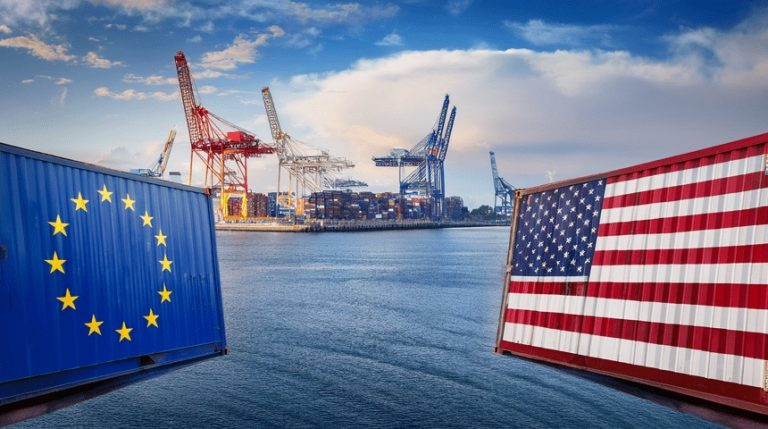EU-US Trade Deal Sparks Concerns Over Imbalance and Economic Uncertainty, Economist Warns
- Flexi Group
- Aug 5, 2025
- 3 min read
The recently announced trade agreement between the European Union and the United States is drawing sharp criticism for favoring U.S. interests and heightening economic uncertainty, according to economist Tassos Yiasemides.

Yiasemides believes the imposition of new tariffs by the U.S. is not only disrupting global supply chains but also accelerating deglobalisation trends, with significant short-term economic consequences. “Uncertainty remains because many agreements have not been finalised while the new announcement by US President Donald Trump regarding the imposition of tariffs on a large number of countries is causing reactions and problems in the supply chain,” he stated.
He also warned that the strengthening of the euro against the dollar, combined with the newly announced tariffs, is placing a heavier burden on European exporters. “The fact that the euro has strengthened against the dollar despite interest rate cuts by the European Central Bank makes European products more expensive, with tariffs combined with a 10 to 15 per cent increase due to the exchange rate,” he underlined.
Yiasemides criticized the EU-US trade agreement as being unbalanced and lacking depth, claiming it emerged from a rushed, semi-official process. “The current trade agreement appears to deviate from the philosophy of the EU, which has traditionally invested in promoting free trade and multilateral cooperation based on common rules and institutional dialogue,” he said. “Although it temporarily reduces insecurity and volatility, it has also been described as a dignified defeat because while the 30 per cent tariff level was avoided, the agreement is considered unbalanced.”
He emphasized that the deal was signed without adequate input from EU member states and lacked meaningful public debate. “The EU-United States agreement emerged from a quick and rather unilateral dialogue without substantial consultation with member states, without serious public debate and without a clear assurance of symmetrical concessions,” he explained.
Yiasemides also noted the absence of clarity in the agreement’s implementation.
“Clarifications are needed regarding its practical application, such as the specific products subject to the specified tariff rate,” he said. He pointed out that tariffs on pharmaceutical products have been deferred until 2027, while a 50 per cent tariff on steel and aluminium remains in force.
On the issue of fossil fuels, he raised concerns about the scale of European commitments.
“There are significant commitments regarding the purchase of fossil fuels, and the amount that must be spent within three years is considered excessive,” he said, adding that Europe risks becoming energy-dependent on the U.S. following its previous dependency on Russia.
He warned that this shift also relates to arms procurement, stating, “Some reports suggest that Europe will become energy dependent on the US after Russia as well as on the purchase of armaments programmes.”
Such developments, Yiasemides argued, contradict EU goals around green transition, digital innovation, and strategic autonomy. “This contradicts the EU’s own decisions on green transition, digital innovation and strengthening European strategic autonomy,” he stressed.
He further pointed out that the 15 per cent tariff primarily affects European goods entering the U.S., with no reciprocal arrangement. “The 15 per cent tariff will only affect European products imported into the United States and not the other way round while Europe remains a net and significant importer, possibly even dependent, on US technology,” he remarked.
Yiasemides expressed disappointment that broader digital taxation issues were not part of the negotiations. “The EU does not appear to have put on the table issues relating to the taxation of technology companies operating in Europe,” he noted. “The only concern seems to have been reducing tariffs on cars to safeguard the interests of certain countries or at least avoid irreparable damage.”
As the implications of the agreement unfold, Yiasemides warned that Europe’s industrial sector may experience a downturn, particularly in export-heavy economies. “The economic impact of the agreement is expected to become more apparent over time,” he said. “The new trade regime could lead to a slowdown in Europe’s industrial sector and in countries with a strong export presence.”
Fiscal flexibility is another concern. “The reduction in outward-looking activity combined with existing fiscal pressures may limit the fiscal flexibility of states already facing challenges,” he said.
In conclusion, Yiasemides stressed that Europe needs new policy mechanisms and institutional reforms to remain competitive on the global stage. “Europe needs new policy tools and institutional renewal in order to be able to negotiate as an equal partner in an increasingly competitive environment,” he said. “The return to the logic of protecting industrial capacity does not mean a departure from the principles of free trade but an adaptation to the new reality. Europe cannot remain open when its main partners are choosing increasingly inward-looking strategies.”
By fLEXI tEAM





Comments